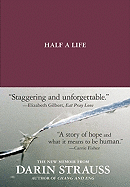
 Imagine yourself a few weeks from your high school graduation, cruising down the road with a carload of your friends. Now imagine the almost inconceivable: a fellow student riding her bicycle swerves into the path of your car and is killed instantly. Novelist Darin Strauss was the driver of that car in May 1988 and Half a Life is the intense, searching account of the path he traveled from that grim day to the present.
Imagine yourself a few weeks from your high school graduation, cruising down the road with a carload of your friends. Now imagine the almost inconceivable: a fellow student riding her bicycle swerves into the path of your car and is killed instantly. Novelist Darin Strauss was the driver of that car in May 1988 and Half a Life is the intense, searching account of the path he traveled from that grim day to the present.
What made Strauss's experience so fraught was that the death of 16-year-old Celine Zilke was as close as such a collision can be to a true accident. There was no alcohol, no speeding and no distracted driving. Indeed, years after the event, a friend shared with him one of Celine's diary entries he chose to interpret as an announcement of her intention to commit suicide that day. Even her parents at first appear to grant him absolution. In a sense, Strauss seems to be saying, the absence of any reason to experience true guilt only served to intensify that emotion.
Adopting a brave narrative technique, beginning with the accident itself ("Half a life ago, I killed a girl.") and then carrying the story forward, Strauss challenges us to join him in a series of painful encounters in the wake of Celine's death: his return to school, her funeral, an assembly where the principal announces a scholarship in her memory and, finally, a brief, awkward visit to the Zilke home. And the farther he travels into adulthood, shadowed by the memory of the accident, the more difficult it becomes to leave it behind.
Lured by the prospect of a financial windfall, Celine's parents soon abandon their apparent willingness to forgive and file a multimillion-dollar damage claim. Strauss's sketchy account of that litigation will appear cryptic to non-lawyers and inexplicable to members of the legal profession (he appears for a deposition without meeting his attorney in advance, for example), and its indecisive conclusion does nothing to speed his healing process.
But Strauss's memoir is worth reading for more than its narrative. In one aphoristic observation after another, his prose burns with a quiet intensity. Describing the immediate aftermath of the accident, he writes, "Trauma makes a spark that in a white glow washes out details, guilt, shame--a flare that throws the recent past into shadow and deep obscurity." And in a bizarre return to the scene in his therapist's Porsche, he observes, almost with a sense of wonderment, "Only days later, and it was already just a spot. A spot with geese and a spear of light."
"So few of our days contain actions that are irrevocable," Strauss notes. "Our lives are designed not to allow for anything irrevocable." His story is a stark reminder of what happens at those blessedly rare moments. Its unbridled honesty in confronting tragedy offers both insight and inspiration.--Harvey Freedenberg
Shelf Talker: Novelist Darin Strauss (Chang and Eng) delivers a profound account of his role in an accident that claimed a young woman's life and the aftermath of that tragedy.

